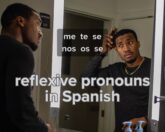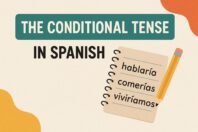Present Perfect Progressive Spanish: Explained in 2 minutes

Get our free email course, Shortcut to Conversational.
Have conversations faster, understand people when they speak fast, and other tested tips to learn faster.
More infoWe’re going to let you in on a little secret….the Present Perfect Progressive in Spanish is a tense that doesn’t *actually* exist.
Or better put, unlike the English equivalent, it’s not grammatically correct.
In fact, it’s not even officially recognized by the RAE (Royal Spanish Academy).
Despite this, you’ll often hear native speakers speak in present perfect progressive Spanish, which means that you should know how to use it.
So what is this tense used for?
An easy way to remember it is as the “I’ve been doing something” tense.
For example,
- I’ve been learning how to speak Spanish for years
- They’ve been waiting up for hours
- He’s been singing since he was a kid
In other words, present perfect progressive Spanish is used to describe a continuous action that was initiated in the past and continues to happen.
And to use this tense, all you need is the below formula:
- Auxiliary verb Haber conjugated + the past participle of Estar + gerund of the main verb + complement
Now, some examples of this tense in action:
- I’ve been studying Spanish for 2 years – He estado estudiando español por 2 años
- I’ve been working since I was 17 years old – He estado trabajando desde que tengo 17 años
- She has been crying all afternoon since she heard the news – Ella ha estado llorando toda la tarde desde que oyó la noticia
- They have been fighting for 30 minutes – Han estado peleando por 30 minutos
While the present perfect progressive is used on a day to day basis, native speakers don’t normally use this tense for formal statements (spoken or written).
Instead, they tend to use the Present Perfect, which as you’ll see is very similar.
In case you’re not already familiar with this tense, it’s used to describe an action that started and finished in the past, but happened in a recent enough time frame that it is connected to the present.
To conjugate in the present perfect tense, all you need is the below formula:
- Auxiliary verb Haber conjugated + past participle of the main verb,
And now, the same examples as we saw before, but this time in the present perfect.
- I’ve studied Spanish for 2 year – He estudiado español por 2 años
- I’ve worked since I was 17 years old – He trabajado desde que tengo 17 años
- She has cried all afternoon since she heard the news – Ella ha llorado toda la tarde desde que oyó la noticia
- They have fought for 30 minutes – Ellos han peleado por 30 minutos
As you can see, the difference between both tenses is subtle. At times, you may even be able to use either tense interchangeably.
Present Perfect Progressive in Spanish: Exercises
Let’s finish with some simple exercises.
Change the following sentences in Present Perfect Progressive to Present Perfect.
(scroll below for the answers)
- Hemos estado teniendo mucho trabajo esta semana (We’ve been having a lot of work this week)
- Ella ha estado viendo televisión toda la tarde (She has been watching television all afternoon)
- El noticiero ha estado hablando de esa noticia todo el día (The news has been talking about that news all day)
- Nosotras hemos estado ensayando mucho para la presentación (We have been rehearsing a lot for the presentation)
- Tu mamá te ha estado llamando mucho (Your mom has been calling you a lot)
- Ellos han estado comiendo muchos vegetales esta semana (They have been eating a lot of vegetables this week)
- Nosotros hemos estado sembrando árboles (We have been planting trees)
- Ella ha estado yendo al médico todos los meses (She has been going to the doctor every month)
- Ellos han estado escuchando esa música todo el día (They’ve been listening to that music all day)
- El jardinero ha estado regando las plantas (The gardener has been watering the plants)
Answers
- Hemos tenido mucho trabajo esta semana
- Ella ha visto televisión toda la tarde
- El noticiero ha hablado de esa noticia todo el día
- Nosotras hemos ensayado mucho para la presentación
- Tu mamá te ha llamado mucho
- Ellos han comido muchos vegetales esta semana
- Nosotros hemos sembrado árboles
- Ella ha ido al médico todos los meses
- Ellos han escuchado esa música todo el día
- El jardinero ha regado las plantas



